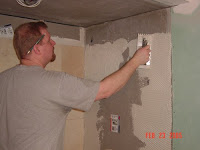How to Tile Shower Ceilings
 Last week I was asked if I could explain how to install tile on an overhead surface (shower ceiling). Well I’ve done it once so I thought I’d share my experience installing marble tile on a shower ceiling.
Last week I was asked if I could explain how to install tile on an overhead surface (shower ceiling). Well I’ve done it once so I thought I’d share my experience installing marble tile on a shower ceiling.
The first thing that I’d like to share is the importance of a proper substrate surface to install tile on for showers. If you’re going to do a tiled shower then you need to take every step possible to prevent water from leaking out and damaging your home.
For this project I used Durock underlayment. I made sure to screw the Durock to the framing as specified. Next I sealed all the joints with silicone caulk first. Then I used special tape made by Durock and thinset to seal all the joints.
Once I was ready to install the  marble tile I spent some time dry fitting the first coarse of tile to come up with a layout that we liked. Marble tile is fairly heavy so it’s best to work from the bottom up so that the lower levels of tile can support the work as you go. I only recommend using a cementitous thinset product. It doesn’t make sense to me to use a latex mastic product in such a wet environment. However, thinset is much harder to work with on vertical and overhead surfaces. So be prepared to be patient and take your time setting tiles in this manner.
marble tile I spent some time dry fitting the first coarse of tile to come up with a layout that we liked. Marble tile is fairly heavy so it’s best to work from the bottom up so that the lower levels of tile can support the work as you go. I only recommend using a cementitous thinset product. It doesn’t make sense to me to use a latex mastic product in such a wet environment. However, thinset is much harder to work with on vertical and overhead surfaces. So be prepared to be patient and take your time setting tiles in this manner.
Once the walls are finished then you can concentrate on installing the tiles on the ceiling. You’ll want to snap some lines on the ceiling to help yourself with the layout as you go. Working on the ceiling is hard enough without worrying about whether you’re keeping your layout square and parallel. If you’re installing tile on the ceiling above a fiberglass or acrylic tub you’ll want to use some wood or cardboard to protect it in case of a falling tile.
Mix up the thinset according to the manufactures specifications. It’s crucial to following the directions closely and only use the recommended amount of water. Mix the thinset well mechanically, let sit to slake, remix and you’re ready to start. It’s best to apply the thinset to the back of the tile (back butter) so that you get full coverage without air pockets. Push the tile up against the Durock on the ceiling and give it a little twist to help seat it well. Next I like to use some painters tape to help hold it in place. Work quickly to finish a full row of tile
Here’s the step that I learned after having several tiles fall down. Make some “dead man” temporary “T” supports out of some scrap 2×4 materials. You’ll want to make these ahead of time and get the length the correct size so that you don’t struggle putting them up. In the photo you can see I installed a new “dead man” temporary support for each row of tile. This ensured that the tile could set up properly without pulling away from the Durock.
I made each “dead man” support slightly shorter than it needed to be so I could shim up the bottom of it to produce a nice tight fit. I left the “dead man” supports in place for 24 hours before removing them and grouting the tile.
Tiling a ceiling in a shower enclosure is a great way to prevent moisture problems and it creates a beautiful touch to any shower.
Tools You Need For This Project
The following tools are very useful for tiling:













Todd – Excellent post, and one that Kim and I might make use of when we finish our master bath.
Thanks so much for the tip…The prospect of 12″x18″ tiles falling was pretty frightening! Appreciate your help!
Thanks. I have seen so many bathrooms where there weren’t tiles on the ceilings. This will help a lot with the Stone House when we go to do the bathrooms.
Thanks for the advice. I found this to be simple to understand and to the point.
Thanks for the advice. I am tiling my shower and ceiling and will definitely use these tips.
thanks
Jim – You’re very welcome. Send us some photos after to share with everyone.
Do you mind if I quote a few of your posts as long as I provide
credit and sources back to your site? My blog site is in the
very same area of interest as yours and my users would
certainly benefit from some of the information you present here.
Please let me know if this ok with you. Thanks!
sure
Read an article on JLC indicating that shower ceiling should be sloped/curved to allow water to run off. They state that a flat ceiling causes “The unsightly brown spots that you often see on flat tiled ceilings are actually the beginning of stalactites forming as water vapor condenses on the ceiling tiles and leaches minerals out of them.” I have a 3’x5′ shower with 69″ high walls and an oversized exhaust fan with room above the shower door and ceiling. Do you seen any concerns?
Dan – We slope the ceilings in steam showers for that very reason. It certainly isn’t a bad idea in a regular shower as well. My current shower is over 10 yrs old…no issues yet..but I do have a very good exhaust fan. It’s a great recommendation….but each situation has to be judged separately. Good luck.
nice to see a real contractor use supports for ceiling tiles. for your readers , I can vouch for using 3rd hand jacks on ceiling tiles. i have used 24 x 12 porcelain tiles now on two bathrooms in my house. good framing support and durorock make for beautifil results. say goodbye to moldy sheetrock on bathroom ceilings!!